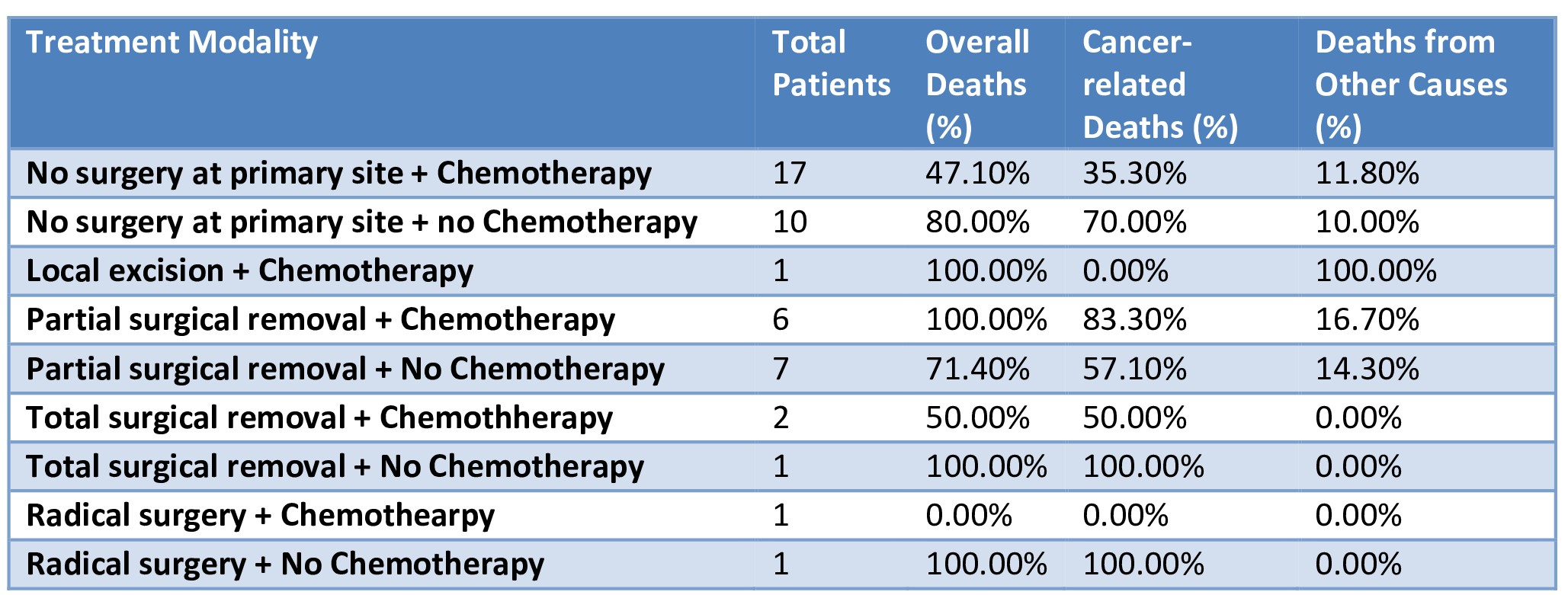Tuesday Poster Session
Category: Practice Management
P6181 - ALK-Positive Anaplastic Large Cell Lymphoma of the GI Tract: A Population-Based SEER Study
Tuesday, October 28, 2025
10:30 AM - 4:00 PM PDT
Location: Exhibit Hall
- PK
Priyaranjan Kata, MD
MedStar St Mary's Hospital
Leonardtown, MD
Presenting Author(s)
Sheilabi Seeburun, MD1, Priyaranjan Kata, MD2
1Rutgers Health Community Medical Center, Toms River, NJ; 2MedStar St Mary's Hospital, Leonardtown, MD
Introduction: Anaplastic large cell lymphoma (ALCL), ALK-positive, is a rare subtype of T-cell lymphoma, with uncommon gastrointestinal (GI) tract involvement. Due to its low incidence, data on demographic patterns, tumor distribution, and treatment outcomes remain limited. We conducted a population-based analysis to characterize clinical features and treatment-associated mortality using the SEER database.
Methods: A retrospective cohort study was performed using the SEER 8-Registry database (2000–2021). Patients with ALK-positive ALCL (ICD-O-3 code 9714/3) involving GI tract sites (C15–C26) were included. Variables included demographics, tumor site, grade, stage, treatment modality (surgery and/or chemotherapy), and vital status. Mortality outcomes, including overall and cancer-specific death, were analyzed across treatment groups using descriptive statistics in BlueSky Statistics.
Results: The cohort included 46 patients, predominantly male (73.9%) and White (78.3%), with the most common age group being 70–74 years (15.2%). The most frequent sites were the jejunum (21.7%), duodenum (10.9%), and liver (10.9%). T-cell phenotype was most common (45.7%). At diagnosis, 41.3% of patients had distant disease, 34.8% localized, and 23.9% regional. No surgery was performed in 58.7% of cases; 58.7% received chemotherapy. Mortality outcomes by treatment group were as follows: no surgery with chemotherapy (n=17) had 47.1% overall and 35.3% cancer-related death; no surgery without chemotherapy (n=10) had 80.0% overall and 70.0% cancer-related death. Among those undergoing partial surgical removal, those who received chemotherapy (n=6) had 100.0% overall and 83.3% cancer-related death, while those without chemotherapy (n=7) had 71.4% overall and 57.1% cancer-related death. Patients with total surgical removal and chemotherapy (n=2) had 50.0% mortality, all cancer-related, whereas the single patient without chemotherapy died from cancer. Radical surgery with chemotherapy (n=1) had no deaths, while without chemotherapy (n=1) there was 100.0% cancer-related mortality. One patient underwent local tumor excision with chemotherapy and died from non-cancer-related causes.
Discussion: Despite the variability in treatment approaches, overall mortality was substantial, particularly among patients who did not receive chemotherapy. While the results are limited by the small sample size and lack of granular clinical data, they contribute important real-world insight into this rare GI lymphoma subtype.

Figure: Table 1. Mortality outcomes by treatment modality and chemotherapy status in patients with ALK-positive anaplastic large cell lymphoma of the gastrointestinal tract (N=46). Data reflect overall mortality, cancer-specific mortality, and death from other causes as percentages within each treatment group.
Disclosures:
Sheilabi Seeburun indicated no relevant financial relationships.
Priyaranjan Kata indicated no relevant financial relationships.
Sheilabi Seeburun, MD1, Priyaranjan Kata, MD2. P6181 - ALK-Positive Anaplastic Large Cell Lymphoma of the GI Tract: A Population-Based SEER Study, ACG 2025 Annual Scientific Meeting Abstracts. Phoenix, AZ: American College of Gastroenterology.
1Rutgers Health Community Medical Center, Toms River, NJ; 2MedStar St Mary's Hospital, Leonardtown, MD
Introduction: Anaplastic large cell lymphoma (ALCL), ALK-positive, is a rare subtype of T-cell lymphoma, with uncommon gastrointestinal (GI) tract involvement. Due to its low incidence, data on demographic patterns, tumor distribution, and treatment outcomes remain limited. We conducted a population-based analysis to characterize clinical features and treatment-associated mortality using the SEER database.
Methods: A retrospective cohort study was performed using the SEER 8-Registry database (2000–2021). Patients with ALK-positive ALCL (ICD-O-3 code 9714/3) involving GI tract sites (C15–C26) were included. Variables included demographics, tumor site, grade, stage, treatment modality (surgery and/or chemotherapy), and vital status. Mortality outcomes, including overall and cancer-specific death, were analyzed across treatment groups using descriptive statistics in BlueSky Statistics.
Results: The cohort included 46 patients, predominantly male (73.9%) and White (78.3%), with the most common age group being 70–74 years (15.2%). The most frequent sites were the jejunum (21.7%), duodenum (10.9%), and liver (10.9%). T-cell phenotype was most common (45.7%). At diagnosis, 41.3% of patients had distant disease, 34.8% localized, and 23.9% regional. No surgery was performed in 58.7% of cases; 58.7% received chemotherapy. Mortality outcomes by treatment group were as follows: no surgery with chemotherapy (n=17) had 47.1% overall and 35.3% cancer-related death; no surgery without chemotherapy (n=10) had 80.0% overall and 70.0% cancer-related death. Among those undergoing partial surgical removal, those who received chemotherapy (n=6) had 100.0% overall and 83.3% cancer-related death, while those without chemotherapy (n=7) had 71.4% overall and 57.1% cancer-related death. Patients with total surgical removal and chemotherapy (n=2) had 50.0% mortality, all cancer-related, whereas the single patient without chemotherapy died from cancer. Radical surgery with chemotherapy (n=1) had no deaths, while without chemotherapy (n=1) there was 100.0% cancer-related mortality. One patient underwent local tumor excision with chemotherapy and died from non-cancer-related causes.
Discussion: Despite the variability in treatment approaches, overall mortality was substantial, particularly among patients who did not receive chemotherapy. While the results are limited by the small sample size and lack of granular clinical data, they contribute important real-world insight into this rare GI lymphoma subtype.

Figure: Table 1. Mortality outcomes by treatment modality and chemotherapy status in patients with ALK-positive anaplastic large cell lymphoma of the gastrointestinal tract (N=46). Data reflect overall mortality, cancer-specific mortality, and death from other causes as percentages within each treatment group.
Disclosures:
Sheilabi Seeburun indicated no relevant financial relationships.
Priyaranjan Kata indicated no relevant financial relationships.
Sheilabi Seeburun, MD1, Priyaranjan Kata, MD2. P6181 - ALK-Positive Anaplastic Large Cell Lymphoma of the GI Tract: A Population-Based SEER Study, ACG 2025 Annual Scientific Meeting Abstracts. Phoenix, AZ: American College of Gastroenterology.
